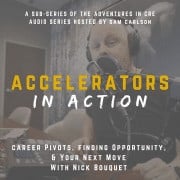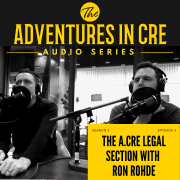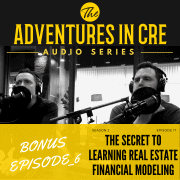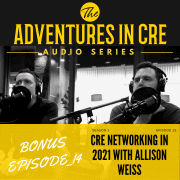Here’s What To Expect In Season 3 | S3E1
Welcome to Season Three of the A.CRE Audio Series! In this season, I am joined by the creators of Adventures in CRE, Spencer Burton, and Michael Belasco. This season is the first chance Spencer, Michael and Sam had been able to get together in person since 2019, and so they decided to do something special. As opposed to past seasons, season 3 is focused entirely around a central theme:
Deal Making and Deal Doing.
This series is comprised of 8 episodes that deep-dive the various nuances of what it takes to both create deals at the highest levels, and to get them closed like a pro.
Here are some of the highlights:
- How to develop and create an investment strategy others can get behind
- How to source deals and fill your pipeline like a pro
- How to assemble your Capital Stack, both equity and debt
- How to perform Due Diligence like a pro
- Expert-level Asset Management and executing your plan
- Bringing the whole strategy to completion with proper Disposition
These episodes are full of nuance, context, and stories for listeners who want an authentic look at how deals come together in the real world.
Watch this episode to learn about everything you can expect in this season. So, on behalf of Spencer, Michael, and the entire A.CRE Team … enjoy season 3, and the best of luck to you and your Adventure in CRE.
What To Expect In Season 3
Or Listen to this Episode
Resources from this Episode
Episode Transcript
Announcer (00:00):
Welcome to the Adventures in CRE Audio Series. Join Michael Belasco and Spencer Burton as they pull back the curtain on everything commercial real estate, and introduce you to some of the top minds in the industry. If you want to take your skills to the next level and be part of a growing community of CRE professionals across the world, this is for you.
Sam Carlson (00:24):
All right. Welcome back. As you can see, today’s episode is a little bit different than what we’ve been doing over the past year or so. I’ve got Michael and Spencer here in the studio. What’s up guys?
Michael Belasco (00:35):
Sam, nice to see you in person, yeah.
Sam Carlson (00:37):
Yeah, it’s pretty fun. So this season is going to be a lot of fun. I guess let’s introduce the season. This is season number three, okay. This was an audio series when we started. We did season two, this is season three. In the middle we threw in a little bit of podcast, would you call it a podcast what we are now? Or what would you say we are today I guess?
Michael Belasco (00:54):
Well, we’re still an audio series, right? The purpose is to create these seasons as we have time. Ultimately we’re industry professionals. That’s what we do in our day job. And so we don’t have necessarily the bandwidth to do a regular podcast.
Sam Carlson (01:09):
Right, well, so let’s talk about season three. We came into season three thinking, first of all, we’ve been pent up. We haven’t been able to get together. This is the first time the three of us have been together since 2019, is that right?
Spencer Burton (01:21):
Yeah, that’s right.
Sam Carlson (01:23):
And we thought, we want to do something a little bit different and that is maybe make a theme that carries throughout this entire season. Okay? And spend a little bit more time to develop the nuances of what it takes to both make deals and get deals done. Is that a safe way of architecting the season? Or how would you explain it? Let’s turn over to you Spencer, to kind of lay out what the season looks like. And then we’ll talk about, in this season, why we’re doing it because I think your guys’ background and where you’re at today makes season three, probably the most exciting and fun season that we’re going to do. So before we get into it, deal making, deal doing, let’s see what you guys, Spencer.
Spencer Burton (02:07):
Yeah. So, maybe set it up a little bit. While we were in the pandemic, we were doing supplementary episodes, let’s call them. We couldn’t get together and we did these remote things. And in one of those episodes, I don’t remember which, this concept of real estate deal making and deal doing, came up. And it’s really not a naming convention that’s common within the industry. This is the term that just kind of popped up organically. But the general concept goes that there is a process in the industry. And there really is a separation of professionals between those who are just great at deal making and those who are great at deal doing. And the skill sets that make for a great deal maker, Michael very much has. And he’s going to share of his experiences.
Spencer Burton (03:00):
We’re going to share some war stories, and I say war stories, case studies from my own careers and experiences. And then on the deal making side, which is more where I’ve lived in my career, we’re going to talk what it means to make deals happen, to make strategies happen, to put the capital in place, to make that a reality.
Sam Carlson (03:20):
So, Michael, from your perspective, again, we were talking. I think that collectively, the three of us, we really knew that we wanted this season to be a lot of fun. I think season one, we brought in a lot of phone calls and interviews and things like that. And this season really is going to highlight the two of you, but not just for any reason. I think what makes Adventures in CRE and all of the stuff that we do so intriguing is the fact that you guys are in it, putting your fingers into deals and actually getting them done. And I… That episode you’re talking about, we’re talking about deal making and deal doing, that came up and you were saying… I don’t necessarily know some of those, the nuances of what… I think I’d asked a question or something and you didn’t know, and you’re like, “well, that’s really a deal doing thing, what Michael is like an expert on. He really knows that.”
Sam Carlson (04:14):
And so I think it would be interesting maybe from you Michael, to just get an idea, like an overview of what kind of things, when you in your scope of getting deals done. I mean, there’s a lot of that detail oriented work, everything else, solving problems, everything, give us an overview of some of the ideas and concepts and situations that you’re finding and what we hope to get to in this, in this particular season.
Michael Belasco (04:42):
Yeah. So a lot of… When we talk about making and doing a lot of the making happens in the doing is a lot of very, it’s understanding the actual risks, like there’s assumptions that are made, to making sure that this deal actually is true. And when you’re doing the doing, there’s a verification of that once that’s been done. Then there’s a move into the stabilized phase, which is really the management of these properties and how that all works, eventually to the sale. So all of these pieces come in, like the maker side creates the dream and then the doing side brings in the reality. So when it goes from making it comes into the due diligence world for example.
Sam Carlson (05:18):
Is it kind of like, he gets to look at the world through rosy colored glasses and you get to look at the… Like, you get a taste of reality.
Michael Belasco (05:25):
Yeah, it’s so funny because… What is that symphony or there’s that theme song. So we have this thing in our company. I’ve been dubbed Dr. Death at times. Because the dreamers come in and then we get through the reality. You’re doing due diligence and you uncover things and there’s processes by what you do. It’s methodical. A lot of times people go through an approach as like this big mess and really it’s, there’s ways to process that make it very smooth and you uncover these risks and then you have to go back to the team that was all excited and give them the news. Hopefully it doesn’t happen much, but in that context, what happens is the makers get smarter, they learn through that. And then when they’re out creating the dream, they say, “oh, there’s a lesson learned from this. Why don’t we check that?” So there’s a lot of connectivity. And now we’ve decided to use this splitting convention. It’s not entirely… Nothing is 100% true in that vernacular, so to speak.
Michael Belasco (06:24):
But you know, we’ll talk a little bit about due diligence about transitions, managing, a little bit about queuing up for selling. So we’ll go through a little bit of each of that. And a lot of this series is really, we bring in people, we talk about a lot of ideas. We do a lot of stuff about careers, how to grow. Personally, now I think this series, what’s really exciting is we’re actually going to talk about real estate and like the actual processes. And I don’t think we’ve really done that before, because when we bring on guests, there’s something exciting to talk about. Here it’s like, let’s get into the nitty gritty and it’s going to be exciting, but we’re going to do it through stories and sort of where we’ve lived. So it’s a little bit of a preview, there’s a lot to discuss within there. And we’ll-
Spencer Burton (07:08):
Yeah. The only thing I’ll add is on the making, I’m sorry, on the doing side, Michael spent a fair portion of his career in the development world. I’ve spent a good amount of time in the development world, and that’s very much a doing process, right? There’s makers upfront, but ultimately someone’s got to get the entitlements. Someone needs to line up the plans and put the schedule in place. And that’s very much a doer and Michael is just superb at that. So we’re going to share some stories from our collective careers that we hope will be interesting on the doing side.
Sam Carlson (07:42):
You know, Michael, you said something there is… And when you were sharing that there is almost an overlap between what the two of you collectively do. Because it’s a collective effort at the end of the day,
Michael Belasco (07:55):
There’s like a baton passing. Currently how we work together, there is a baton passing and we’re always touching base. So there’s always that interconnectivity between the two paths and even the makers are doing, there’s a lot of doing happening. You could call procuring capital is a making process. There’s a ton of doing in that process as well, but we might categorize that as make. So again, it’s not a perfect fit, but it helps us to explain and provide a framework by which to go through the real estate.
Spencer Burton (08:25):
Well, And I think for the younger professionals, they’re trying to think, they’re trying to discover where within real estate they fit. Having this framework of maker versus doers is valuable because everyone has a different personality, what drives them, what they’re good at and understanding what a doer does, what a maker does, what the skill sets of each are, what skills are valuable for each of those buckets. It will be helpful for those young professionals to guide their career decision.
Sam Carlson (08:57):
Yeah. When I hear you guys talk about this, it reminds me of, the best metaphor is almost… We used to know a guy that used to say, “read off the same sheet of music,” and coming from the person who said it was super goofy. But the whole idea of when you’re doing a deal, when you’re collaborating as a team, you really need, it’s a dance okay? You should find a beat, you should find a rhythm and you should find how you work and move together. Because before that, whenever you’re starting something new, or whenever you maybe bring a deal together that you’re not as seasoned on you don’t have the experience level on whatever the property type is. You’re going in with some unknowns. And so that’s going to create some friction. It’s going to get you off beat per se.
Sam Carlson (09:47):
And I think one of the really interesting things that I hope, and again, I get to listen to your guys’ stories of deals that you’re working on, things that happen like that. And it’s funny, because you’ll go through a deal, and then the next deal, it’s almost like you’re starting to hear a different tune right. To stay within that same metaphor. Go ahead.
Michael Belasco (10:10):
Yeah, no, there’s one piece I love that you said that it’s like everybody’s reading off the same sheet of music. There’s an orchestration to the whole thing. And if you get really good at it, it becomes that where somebody is sitting in that conductor seat. So when stuff comes through from the maker side, it’s not only your team here, there’s a whole group of third parties. The seller, the seller’s broker, your environmental consultants, the title company. There’s so many of these different people involved that you’re… And you’re orchestrating it in time. So it’s a great metaphor.
Sam Carlson (10:46):
So let’s take one step back, because this is more of an introduction episode for this season, just to give people an overview of what to expect. I do anticipate that these episodes will be longer, more conversational, more… I think the power… In the same way that the power of the accelerator are the case studies that are married up with the information, we’re going to try and bring that same element into this podcast where we’ll share case studies and actual situations, leaving out some of the specifics and the actual people involved. So we can talk about those nuances and those deals without maybe divulging some sensitive information. But that’s something that we’re excited about. I wonder if, and I’m putting you on the spot a little bit. You’ve got a lot of stuff written down on that paper, okay. But I want to… Maybe is there a large aggregated piece of debt? I heard you say one.
Sam Carlson (11:40):
So I want to see if it’s the same one that you pick. From that little scribble sheet that you just put… And if you’re listening to this Spencer and Michael, before we started this, were starting to say, “well, if we share the deals, what are we really going to be sharing?” And there was some information that you were talking about as far as the amount of deals that you guys have collectively looked at. Did you write that down or did you just say it out loud?
Spencer Burton (12:02):
I didn’t, why don’t you just tell me the information. That’s a little Seinfeld reference. So are you asking what’s the major theme or what are you getting at Sam?
Sam Carlson (12:15):
There’s a lot of information on that plate. I think people are going to be really excited because whether you’re an analyst or whether you’re a director, whatever your position is, there’s going to be information that we share. And I think it applies to everyone. Because you even went back as far as to when you were starting out in your career and Michael in your career, talking about some of the different deals and just models and things along those lines.
Spencer Burton (12:37):
Yeah, look. Today’s my birthday.
Sam Carlson (12:40):
Oh, it is, yes.
Spencer Burton (12:41):
Yeah, today’s my birthday and I am middle-age. And so I’m at a point in my career where there’s some introspection as I look back. Michael and I, prior to this, while Sam was setting up all of our tech here, he’s our roadie and our producer and everything else. We were sharing one another’s deal sheets. So we track how many deals we’ve done. The dollar amounts, the number by property type through our entire career. And it’s fascinating. So I’m kind of mid-career. I’d like to think I have many, many more years in this. I expect to go well beyond retirement. Because I just love what I do. But nevertheless, I’m, in the traditional sense, mid-career. Together between the two of us, and let me just go to my pad of paper, we have underwritten. And when we say underwritten, these are deals that have gone down the road to some degree, but weren’t closed.
Spencer Burton (13:38):
Now we did not include… Michael and I, right now, if you’re unaware, we work at a company called Stablewood Properties. And we have some really interesting proprietary tech that we’ve developed. And in our current strategy, we underwrite every deal on the market. It’s one of our competitive advantages. So this number does not include those because that’s just too many numbers.
Sam Carlson (13:59):
This is manual underwriting.
Spencer Burton (14:00):
This is manual underwriting that we’ve done in our collective 30 years of experience in the business. So it’s 478 deals.
Sam Carlson (14:08):
That was the number, I was like, “whoa!”
Spencer Burton (14:09):
Yeah 478 deals, 34.2 billion. And we’ve been fortunate to work for some high volume shops, large institutions. And so the numbers are… The aggregate amount of the investments is hard. Of those, 115 closed 8.1 billion.
Spencer Burton (14:30):
And the reason I bring those numbers up is that… First that’s this introspection, I’m at the point in my career where there’s some really interesting things that I’ve done over the last 20 years, in my case, 10 years in Michael’s case. And there’s some lessons learned that we want to share today and over this season. And so what I think, where you’re going Sam with your point is whether you’re an analyst or you’re more senior at your firm, there’s things that we’ve learned from this experience to date, and we hope to have many more experiences, that we hope will add value to your career.
Sam Carlson (15:08):
Yeah. Michael, anything you want to add to that, buddy?
Michael Belasco (15:11):
No, not much.
Sam Carlson (15:12):
Lots of deals done.
Michael Belasco (15:14):
Lots of deals done, lots of stories to tell. And the main thing is, with everything that we do here, is to hopefully add a lot of value to-
Sam Carlson (15:20):
Well, and variety of deals too, because you were talking about variety of deals. Huge buildings you were working on and just different things.
Michael Belasco (15:28):
So, like Spencer said on the development side, we’ll touch into that stuff as well. So it’s not just acquisitions, getting things through to management, there’s development stories, so.
Spencer Burton (15:39):
And I think most of our stories will be deals that did not work out, am I right? Those are the ones where you learn the most. They’re painful, but you learn what not to do. And hopefully we’ll share these stories and people will then take that and not make the same mistakes that we made.
Michael Belasco (15:57):
It’ll be interesting to do this 10 years from now, then we’ll talk about the additional mistakes. But yeah, I’m excited to share all the stories and I’ll probably learn a ton from Spencer telling his stories.
Spencer Burton (16:09):
And likewise, yeah. It’ll be good.
Sam Carlson (16:12):
Well, we’re excited to get season three. I mean, just to be here with these guys here today and to produce some more content for you, our listeners and our viewers. We’re excited to get on with season three. And so we will see you on the next episode, stay tuned, subscribe. And thanks for listening.
Announcer (16:30):
Thanks for tuning into this episode of The Adventures in CRE Audio Series. For show notes and additional resources, head over to www.adventuresincre.com/audioseries. Would you like to learn real estate financial modeling in a matter of weeks and do it with zero guesswork? If so, the A.CRE Accelerator is for you. The accelerator is a step-by-step, case-based program designed to teach you exactly what you need to know, and in the order you need to know it. So you can gain both the knowledge and experience to take your career to the next level, to see if the accelerator is right for you, go to www.adventuresincre.com/accelerator.








